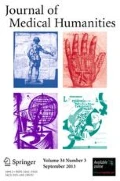Abstract
Some authors have advanced a contractual model to protect patient autonomy within the therapeutic relationship. Such a conception of the physician–patient relationship is intended to serve both parties by respecting patients' choices and preserving physician integrity. I critique this contractual view and offer an alternative, feminist contextualized approach to autonomy within the therapeutic relationship. This approach places the physician-patient relationship within a larger social context, and indicates the many social inequalities that render insupportable the notion of physicians and patients as contracting equals.
Similar content being viewed by others
REFERENCES
Boetzkes, Elisabeth. (1993). Autonomy and advance directives. Canadian Journal on Aging, 12(4), 441–452.
Bower, Lisa C. (1995). The trope of the dark continent in the fetal harm debates: “Africanism” and the right to choice. In Patricia Boling (Ed.), Expecting trouble: Surrogacy, fetal abuse, & new reproductive technologies. San Francisco: Westview Press.
Cernetig, Mero. NWT investigates abortion enquiry. (1992, April 2). Globe and Mail, p. A8.
Held, Virginia. (1987). Non-contractual society: A feminist view. In Marsha Hanen & Kail Nielsen (Eds.), Science, morality and feminist theory. Calgary: University of Calgary Press.
Mackenzie, Thomas B., & Nagel, Theodore C. (1986, February 24–25). When a pregnant woman endangers her fetus. The Hastings Center Report.
Messing, K., & Ouellette, G. (1994). A prevention oriented approach to reproductive problems: Identifying environmental effects. In G. Basen, M. Eichler, & A. Lippman (Eds.), Misconceptions: The social construction of choice and the new reproductive and genetic technologies. Prescott: Voyageur Publishing.
Meyers, Diana T. (1989). Self, society, and personal choice. New York: Columbia University Press.
Poff, Deborah C. (1989). Reproductive technology and social policy in Canada. In C. Overall (Ed.), The future of human reproduction. Toronto: The Women's Press.
Sherwin, Susan. (1995, June). Feminist approaches to autonomy in health care. Paper presented at the Canadian Philosophical Association meeting, Learned Societies' Conference, Montreal, Quebec.
Sherwin, Susan. (1992). No longer patient: Feminist ethics & health care. Philadelphia: Temple University Press.
Sherwin, Susan. (1992). Feminist and medical ethics: Two different approaches to contextual ethics. In H.B. Holmes & L.M. Purdy (Eds.), Feminist perspectives in medical ethics. Indianapolis: Indiana University Press.
Veatch, Robert. (1972, June). Models for ethical medicine in a revolutionary age. The Hastings Center Report, 2, 100–104.
Veatch, Robert. (1981). A theory of medical ethics. New York: Basic Books.
Warren, Mary Anne. (1988, January). IVF and women's interests: An analysis of feminist concerns. Bioethics, 2, 37–57.
Wendell, Susan. (1996). The rejected body: Feminist philosophical reflections on disability. New York: Routledge.
Author information
Authors and Affiliations
Rights and permissions
About this article
Cite this article
Parks, J.A. A Contextualized Approach to Patient Autonomy Within the Therapeutic Relationship. Journal of Medical Humanities 19, 299–311 (1998). https://doi.org/10.1023/A:1024988910929
Issue Date:
DOI: https://doi.org/10.1023/A:1024988910929




